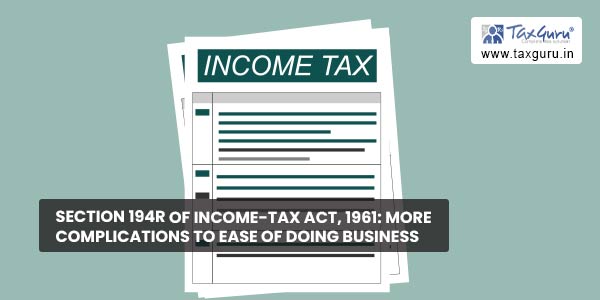Central Board of Direct Taxes (CBDT) has issued circular No.12 of 2022 dated 16 June 2022. In this circular the CBDT has given guidelines to regulate the implementation of TDS provisions of new section 194R with respect to the amount of benefits or perquisites arising to any resident from the business or exercise of profession.
Clause 58 of The Memorandum to the Finance Bill 2022 reads as:
TDS on benefit or perquisite of a business or profession
“As per clause (iv) of section 28 of the Act, the value of any benefit or perquisite, whether convertible into money or not, arising from business or exercise of profession is to be charged as business income in the hands of the recipient of such benefit or perquisite. However, in many cases, such recipient does not report the receipt of benefits in their return of income, leading to furnishing of incorrect particulars o income.”
2. Accordingly, in order to widen and deepen the tax base, it is proposed to insert a new section 194R to the Act to provide that the person responsible for providing to a resident, any benefit or perquisite, whether convertible into money or not, arising from carrying out of a business or exercising of a profession by such resident, shall, before providing such benefit or perquisite, as the case may be, to such resident, ensure that tax has been deducted in respect of such benefit or perquisite at the rate of ten per cent of the value or aggregate of value of such benefit or perquisite. For the purpose of this section, the expression ‘person responsible for providing’ has been proposed to mean a person providing such benefit or perquisite or in case of a company, the company itself including the principal officer thereof.

2.1 Further, in a case where the benefit or perquisite, as the case may be, is wholly in kind or partly in cash and partly in kind but such part in cash is not sufficient to meet the liability of deduction of tax in respect of whole of such benefit or perquisite, the person responsible for providing such benefit of perquisite shall, before releasing the benefit or perquisite, ensure that tax has been paid in respect of the benefit or perquisite.
2.2 No tax is to be deducted if the value or aggregate value of the benefit or perquisite paid or likely to be paid to a resident does not exceed twenty thousand rupees during the financial year. 2.3 Further, the provisions of the said section shall not apply to an individual or a Hindu undivided family, whose total sales, gross receipts or turnover does not exceed one crore rupees in case of business or fifty lakh rupees in case of profession during the financial year immediately preceding the financial year in which such benefit or perquisite, as the case may be, is provided.
3. This amendment will take effect from 1st July, 2022.
However, in the circular No.12 of 2022 dated 16 June 2022 issued by CBDT on 16th June, 2022
The answer to the first question in the guidelines mentions:
The deductor is not required to check whether the amount of benefit or perquisite that he is providing would be taxable in the hands of the recipient under clause (iv) of section 28 of the Act. The amount could be taxable under any other section like section 41(1) etc. Section 194R of the Act casts an obligation on the person responsible for providing any benefit or perquisite to a resident, to deduct tax at source @ 10%. There is no further requirement to check whether the amount is taxable in the hands of the recipient or under which section it is taxable.
Thus, the circular in its spirit has ruled out the very basic purpose of introducing sec 194R as mentioned in clause 58 of the memorandum of Finance Bill 2022.
The question 7 in the guidelines reads as:
Question 7: Whether reimbursement of out- of- pocket expense incurred by service provider in the course of rendering service is benefit/perquisite?
Answer: Any expenditure which is the liability of a person carrying out business or profession, if met by the other person is in effect benefit/perquisite provided by the second person to the first person in the course of business/profession. Let us assume that a consultant is rendering service to a person “X” for which he is receiving consultancy fee. [n the course of rendering that service, he has to travel to different city from the place where is regularly carrying on business or profession. For this purpose, he pays for boarding and lodging expense incurred exclusively for the purposes of rendering the service to “X”. Ordinarily, the expenditure incurred by the consultant is part of his business expenditure which is deductible from the fee that he receives from company “X”. In such a case, the fee received by the consultant is his income and the expenditure incurred on travel is his expenditure deductible from such income in computing his total income. Now if this travel expenditure is met by the company “X”, it is benefit or perquisite provided by “X” to the consultant.
Here it is pertinent to understand the meaning of benefit or perquisite.
These terms are not defined anywhere in the Income Tax Act or in any other Act form where we can draw the meaning of these terms. So, we refer to the dictionary meaning of these terms which are as under:
Benefit : a helpful or good effect, or something intended to help
Perquisite: an advantage or something extra, such as money or goods, that you are given because of your job
Now when we see the question 7 of the guidelines and the answer to the same, it is really surprising how the act or the circular and the guidelines have considered a reimbursement of expenses as “benefit or perquisites”?
For example, let us say ABC Limited having its registered office in Mumbai employs a consultant B also resident of Mumbai to represent itself before the government authorities in New Delhi. To meet its responsibilities of this assignment B is required to travel to Delhi exclusively for representing ABC Limited for which he has to incur expenditure on air tickets from Mumbai to Delhi and also stay at a hotel in Delhi.
Now how one can assume and also conclude that the expenses incurred on travelling and stay is the responsibility of B and not that of ABC Limited. In this case as per language of the section 194R if the expenses are incurred by B first and then claimed from ABC Limited then ABC Limited is required to deduct tax from the payments made to B towards these travel expenses (which is otherwise only reimbursement of expenses). However, if the same is in the first stage borne by ABC Limited then no tax is required to be deducted.
Now if you look at the nature of expenses which are purely reimbursement to B, the consultant and in no way qualify to be “benefit or perquisites” as per the definitions given herein above.
Question 9 Dealer conference – whether benefit/perquisite?
The following expenditure pertaining to deafer/business conference would be considered as benefit or prerequisite:
- Expense attributable to leisure trip or leisure component, even if it is incidental to the dealer/business conference.
- Expenditure incurred for family members accompanying the person attending dealer/business conference.
- Expenditure on participants of dealer/business conference for days which are on account of prior stay or overstay beyond the dates of such conference.
Any company if organises a dealer/business conference generally also organises some events/functions for entertainment of the dealers’ representative and/or his family members to keep them busy during the non-business hours of the conference. Even there are certain activities provided by the hotels themselves to all the residents which could aways be considered as leisure like facilities of gym, sauna, swimming pool, games etc. Now it will always be a big question which dealer enjoys which facility(ies) and which dealer does not join any of them at all. How would such leisure components would be valued for each of the dealer attending the conference?
Further as for the family members of the dealer, if the dealer has already paid their charges for the hotel etc to the hotel and the family member only out of courtesy attends some of the entertainment events organised by the company for all the dealers, then in that case will that attending of the event by the family member be considered as benefit or perquisite?
Besides, the section also stipulates deduction of tax or gifts etc given to staff or officers of customers/suppliers etc. Now does the government want the businesses to ask the officers to pay the required tax to be deducted or pay the tax itself and gross up the value of the gift. Moreover, in such cases where actual payment is not involved how would the recipient show such incomes in the return of income and how the tax will be claimed by them is also a big question.
The government needs to review the provisions of the proposed sec 194R before making them effective as it is going to open a pandoras box of litigations which could result in a non-ending process. The government should also keep in mind the introduction and then abolishment of Fringe Benefit Tax and this section is almost on the same lines of FBT. These provisions look like old wine (FBT) in a new bottle.





